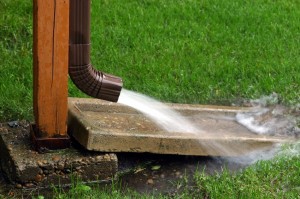The Environmental Protection Agency (EPA) reigns supreme over broad and complex issues involving air and water pollution, hazardous waste, chemicals, radiation, and a wide range of other environmental hazards. Does that include rain?
 Absolutely. The EPA has proposed new regulations to “rein in the rain,” as some skeptics have put it. The requirements were proposed in response to a lawsuit filed by the Chesapeake Bay Foundation, the Natural Resources Defense Council, and other environmental groups. These suits are considered “friendly lawsuits” by EPA insiders, because they force the agency to do what it wanted to do anyway, thus helping lubricate the process and avoid political pressure (as in “we had to do it – the courts made us”). Such suits are friendly for both sides, because tax payers end up paying the legal fees for both. More on that in a future column.
Absolutely. The EPA has proposed new regulations to “rein in the rain,” as some skeptics have put it. The requirements were proposed in response to a lawsuit filed by the Chesapeake Bay Foundation, the Natural Resources Defense Council, and other environmental groups. These suits are considered “friendly lawsuits” by EPA insiders, because they force the agency to do what it wanted to do anyway, thus helping lubricate the process and avoid political pressure (as in “we had to do it – the courts made us”). Such suits are friendly for both sides, because tax payers end up paying the legal fees for both. More on that in a future column.
The regulations are to include “design or performance standards for stormwater discharges from, at minimum, newly developed and redeveloped sites.” Under court order, the new rules were supposed to be published by 2011, but proved to be much more difficult and controversial than their authors expected. EPA tried to reach a compromise last November, but that met with tense congressional hearings and new environmental lawsuits, so the agency continues to insist it will publish new regulations. A cursory look at the impact of such rules certainly explains why so many people are concerned about government control of “stormwater runoff.”
You may think it sounds strange that government could regulate such a thing. But you see, rain has a tendency to create water on the ground and on buildings. Such water then tends to run in a downhill fashion toward streams, rivers, and ultimately oceans. Clearly that cannot be allowed to continue without regulation!
These new rules, once finalized, may dictate the design of roofs, parking lots, streets, curbs, gutters, storm drains, pipes, and a host of other construction features involving drainage. EPA says it has not made final decisions yet, but insiders say the agency will likely set a discharge threshold for properties in the range of 1 to 5 acres and for certain size storms.
Many states already have rules that require large commercial properties to capture and retain stormwater. Still, some environmental groups think we need federal regulation. Some, such as American Rivers, contend that the rule is the most important thing the Obama administration can do to boost “green infrastructure,” such as constructed wetlands that use marshes and trees to filter pollution, rather than concrete structures that control water flow, or more expensive traditional water treatment plants.
The EPA’s stated intent is to regulate such facilities for new construction “at minimum,” and that is the problem. It means EPA may also decide to apply the new standards to already existing cities, towns, neighborhoods, roads, and even homes. Developers should be encouraged to build on already developed property in the cities, rather than continue to sprawl over open lands and farms. This rule could have the opposite effect, and hinder “brownfield” redevelopment projects all across the country.
The cost of implementing such new federal regulations on every new development in the United States can only be guessed, but would be staggering, perhaps the most expensive regulation ever implemented by the EPA. Some municipal officials say stormwater fixes often cost hundreds of thousands of dollars per site.
Research over the past few years, upon which many government programs now rely, focuses on the purported ability of people to change the weather, and even the overall climate of the planet. That’s why EPA has moved steadily into regulation of naturally occurring gases like carbon dioxide (perhaps we will soon be required to stop breathing) – because our lifestyle is said to affect the weather. Yet even the leading climate alarmists do not claim the government can really regulate a natural phenomenon like rain. No, despite all the title references to stormwater, this is all about regulating human activity and business, not water.
So to be clear, you are not just letting rainwater run off your place; you are “discharging” it. On purpose. You may soon need an EPA permit for that.
A bi-partisan coalition in both the House and Senate are seeking to rein in the EPA’s reign. Congress should indeed rain on the agency’s parade, and soon.
(A version of this column appeared in the Grand Junction Daily Sentinel May 1, 2015)




Comments on this entry are closed.